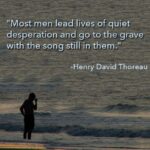The topic I’m going to write about today isn’t the one I wanted to write about. But this isn’t about what I want. It’s about what needs to be addressed because it has to do with a tragedy, a 30-year-old living in pain, admitting it publicly, battling anxiety and depression, and easing that agony by drinking too much alcohol for far too long as a counter-productive coping escape.
Then one day – yesterday — he died, suddenly. The reasons why have not yet been revealed but this is a story we all need to pay attention to so we can help people who are struggling mentally feel more hopeful and better about themselves.
This all sounds as senseless as it was sudden. Two days ago after bogeying the 14th, 15th, and 16th holes in this week’s Charles Schwab Challenge, Grayson Murray withdrew citing an illness. That was the last time he would ever play golf; no more putts, drives, looking at the green grass in the fairway. A life dedicated to a sport abruptly shattered.
Whatever the cause of his death we do know this was a guy who publicly revealed he struggled with depression and anxiety even though – and this is so important – he was one of America’s best junior golfers and had won two PGA Tournaments and was ranked 58th in the world. It’s important because it reminds us even young and talented people can be trapped in mental torment no matter how nonsensical that may seem.
Earlier this year he won the second of those events, the Sony Open, and said words you don’t often get from a champion.
“It’s not easy,” he told Golf Digest. “I wanted to give up a lot of times, give up on myself. Give up on the game of golf. Give up on myself, at times.”
Talking about giving up on yourself while standing in the winner’s circle is a clear sign something’s bothering you. And according to reports he had been battling his emotions for many years especially during seven years without winning a tournament.
“I struggle with comparing myself to others, self-esteem,” he told Golf Digest.
Comparing ourselves with others – I’ve done it and so many others have too, and it’s insidious and no way to find fulfillment in life. Do your best, don’t worry about others, and you will find peace and satisfaction in that. What others do is out of your control.
While comparing himself to others, this man also knew he had exceptional talent.
So he drank alcohol.
During tournament weeks.
As a rookie.
“Because he knew he had talent and felt invincible,” he said.
Saying you felt invincible at any time is another red flag you’re thinking is off target, too extreme, more black and white than it should be – all indicators of depression.
Being a young phenom isn’t the best life arc for a person, I don’t believe. I was one, to a certain extent, and for the rest of my life I’ve been trying to rise to become that level of a phenom and have never really gotten up there again – and it’s frustrating – but I’m mostly over it, and pleased with what I’ve accomplished.
A big winner as a kid, I’ve been almost never a big winner as an adult, at least not in the dominant “nobody’s better than him” sense.
This golfer who has passed on entered Wake Forest University (my alma mater) as a perennial national power in golf, a superb talent.
Will Zalatoris, another former Wake player who is now on the PGA tour, said to NBC Golf: “My guy lived a tough life. His struggles are over and I know he’s not in pain anymore.”
You wonder how playing professional golf could be painful because it’s an outdoor game that seems more fun – and better paying – than most office jobs. Yet all that sunshine outside even while playing a sport can be powerless against the dark clouds swarming inside a person’s mind, the pressures to win, to lower your score, to keep playing well enough to be invited to more PGA tournaments. You can look at someone and not have any idea how bad they feel, the negative thoughts they can’t control, the hopelessness they feel. Because it’s visually concealed.
“You never know what challenges people have going on in their lives and how they may internalize things,” Justin Rose said to NBC Golf.
You sure don’t. Friends and family can’t see it; often doctors can’t either. The darkness is blocked from our view because it’s within a person’s head, deep inside them, and it’s hard for them to admit this out of fear of being viewed as weak when in fact they can be powerless against the demons. Society stigmatizes mental illness. Those who admit it become more ostracized and left to themselves, which feeds the illness.
In this man’s case, however, there were signs he knew he needed help he couldn’t provide to himself. He publicly admitted his troubles and complained to the PGA they weren’t doing enough for players with mental illness.
“When you get tired of fighting, let someone else fight for you,” he told Golf Digest.
Maybe this man got tired of fighting and needed someone else to fight for him. Maybe they were; maybe they weren’t. Maybe he didn’t complain loudly enough. Maybe people just didn’t know how to help him. Maybe they didn’t want to get involved because they struggle with their own problems including mental illness. Maybe none of these theories are true.
Maybe three bogies in a row were too much for him to live with psychologically, the last three dagger stabs in his already bleeding heart. Or maybe it was a culmination of demons finally taking over his will to live. The words he spoke were unambiguous: he was not happy.
Yet for whatever reason – certainly one we’ll never know or understand in our lives because he’s gone forever – the people who could have fought for him didn’t fight enough or maybe did but to no avail.
I write this now because I hope this man is now at peace in Heaven. I write this now to let you know I have struggled with similar challenges though obviously not as serious as this man, and, thank God, have overcome them. Many others, I suspect, contend with mental torment in silence and we just don’t know because they don’t want us to know.
I write this now to let you know that the key to overcoming this is having hope. If you have hope, you feel life is worth living. When you’re depressed, you feel hopeless.
I don’t know why this man died but I suspect it’s because he lost hope. And hopelessness is one of the worst kinds of sadness, a tragedy in some ways worse than all others.
Because it’s so hard to see.
Author Profile

-
Sammy Sportface, a sports blogger, galvanizes, inspires, and amuses The Baby Boomer Brotherhood. And you can learn about his vision and join this group's Facebook page here:
Sammy Sportface Has a Vision -- Check It Out
Sammy Sportface -- The Baby Boomer Brotherhood Blog -- Facebook Page
Latest entries
 BonusJune 17, 2024Ledecky is a Better Athlete Than Me
BonusJune 17, 2024Ledecky is a Better Athlete Than Me BonusJune 17, 2024From Not Liking Swimming to Olympian: Aaron Shackall
BonusJune 17, 2024From Not Liking Swimming to Olympian: Aaron Shackall BonusJune 16, 2024Snubbery Spreading: Clark, Chestnut, Hartley
BonusJune 16, 2024Snubbery Spreading: Clark, Chestnut, Hartley BonusJune 16, 2024Invitation to My Friend, John Williams: Let’s Talk Again
BonusJune 16, 2024Invitation to My Friend, John Williams: Let’s Talk Again





